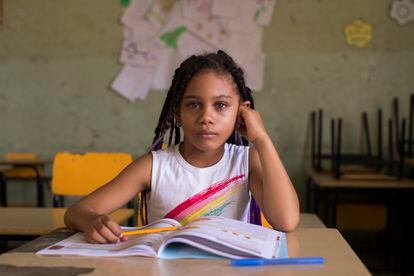A girl in a school in the Dominican Republic.Orlando Barría
More than two years after the covid-19 pandemic, the 170 million children and adolescents in Latin America and the Caribbean have experienced one of the longest school closures in the world, with an entire generation deprived of face-to-face classes, partially or completely, two-thirds of the days to date.
The region thus faces the greatest educational crisis in history, according to the report
Two years later: saving a generation
.
The report notes that, despite local and national efforts, millions of students have lost so much in terms of learning that they are at risk of dropping out of the classroom in the near future.
According to the study, four out of five sixth grade boys and girls may not be able to understand a simple text.
These learning losses would translate into about a 12% decline in lifetime earnings for a student in school today, and are, on average, greatest and most severe in early grades, in younger children, and in children from lower socioeconomic backgrounds.
In “the pandemic, there were virtual classes and we did not have a signal or the money to put up the internet for me to study,” says Margarita, a 13-year-old student from Imbabura in Ecuador.
Only one in four households have an internet connection, according to recent data from 12 countries in the region.
Attendance rates have decreased by 12% during school closures.
Although initial data from some countries show a limited impact on the out-of-school population by the end of 2021, thanks to protective policies, the risk of future school drop-out for children and adolescents is considerable.
Reintegration and permanence in school and recovery of learning
Margarita says “I want to go back to school because it is important” and recognizes that it must be valued because she believes that this way she will be able to get ahead.
If urgent action is not taken for educational recovery, millions of students like her are at risk of dropping out of school because they do not have a sufficient level of learning to continue with their studies.
An entire generation could suffer profound and lasting educational, social and economic consequences.
“It is not enough to reopen schools,” says Emanuela di Gropello, an education specialist at the World Bank.
“We also need to prioritize foundational skills, assess levels of learning, and implement recovery strategies and programs at scale.
An entire generation depends on these actions,” she adds.
Given the difficult situation in which education finds itself in the region, the World Bank, the Inter-American Dialogue, UNESCO, UNICEF and the presidents of Argentina, Ecuador, Chile and Honduras joined in an unprecedented call to all the nations of Latin America and the Caribbean, and to all actors linked to education, to achieve educational recovery through four key commitments:
1. Place educational recovery at the top of the public agenda as a key factor for social and economic recovery after the pandemic
2. Reintegrate all children who have dropped out of school and ensure they stay in school
3. Recover learning and ensure the socio-emotional well-being of children
4. Value, support and train teachers The actions that make up this Commitment to educational recovery require the most ambitious investment in the history of the region, given the political, social and economic particularities of each country and the limitations of connectivity in millions of homes, it is urgent to redouble efforts to eliminate inequalities and achieve educational justice, prioritizing the most vulnerable students.
In the videos below you can see Margarita and other children and adolescents recounting their experiences in the pandemic.
In addition, an exchange between international leaders makes clear the urgency of acting as soon as possible.
Cecilia Martínez Gómez
is a communications consultant for the World Bank.

